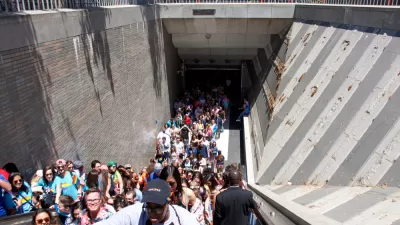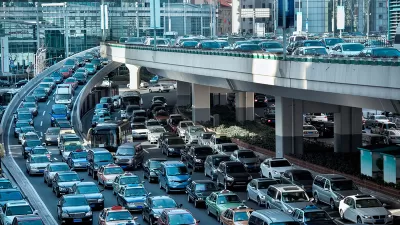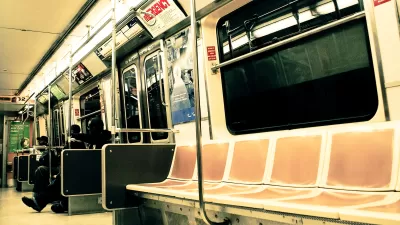The ongoing effort to rid transit systems of riders incapable of living by the Golden Rule continues in Boston, written by a columnist with an obvious case of the Mondays.

Every now and then, according to this article by Nestor Ramos, a transit system functions exactly how it's supposed to, and the world almost seems kind.
Leave it to an inconsiderate or potentially even outright rude rider to ruin a moment like that, like the rider who doesn't hear the message about removing their backpacks, and swings around and smacks you in the head on their way out the door.
An uncomfortable truth about riding the T in Boston, according to Ramos: "A big part of what we talk about when we talk about hating the T isn’t the T at all. It’s each other."
The transit riding courtesy public service campaign is found in most cities with a transit system. Los Angeles, for instance, has pushed the genre into surrealism and opened itself to critique about its biases, so the message is not without risk.
Ramos's approach to transit scofflaws is to provide a list of each variety, as identified in the wild, some with a short nickname associated with their behavior. So there's the "Doorstop," the "Speakerphone," and the "Masticator," but others get a more prosaic signifier, like "people who don't get up for the young" and "people who don't get up for the old."
Number one on the list isn't a stranger at all, according to Ramos. "Kevin From Engineering" is that random person from some other corner or floor of your office that suddenly grabs a spot next to you forcing small talk most of the way home. Not sure if we agree if that's worse than number two on the list, "The Unsolicited Compliment," but nobody asked us.
FULL STORY: The 16 worst people on the T, ranked

Planetizen Federal Action Tracker
A weekly monitor of how Trump’s orders and actions are impacting planners and planning in America.

Chicago’s Ghost Rails
Just beneath the surface of the modern city lie the remnants of its expansive early 20th-century streetcar system.

San Antonio and Austin are Fusing Into one Massive Megaregion
The region spanning the two central Texas cities is growing fast, posing challenges for local infrastructure and water supplies.

Since Zion's Shuttles Went Electric “The Smog is Gone”
Visitors to Zion National Park can enjoy the canyon via the nation’s first fully electric park shuttle system.

Trump Distributing DOT Safety Funds at 1/10 Rate of Biden
Funds for Safe Streets and other transportation safety and equity programs are being held up by administrative reviews and conflicts with the Trump administration’s priorities.

German Cities Subsidize Taxis for Women Amid Wave of Violence
Free or low-cost taxi rides can help women navigate cities more safely, but critics say the programs don't address the root causes of violence against women.
Urban Design for Planners 1: Software Tools
This six-course series explores essential urban design concepts using open source software and equips planners with the tools they need to participate fully in the urban design process.
Planning for Universal Design
Learn the tools for implementing Universal Design in planning regulations.
planning NEXT
Appalachian Highlands Housing Partners
Mpact (founded as Rail~Volution)
City of Camden Redevelopment Agency
City of Astoria
City of Portland
City of Laramie





























